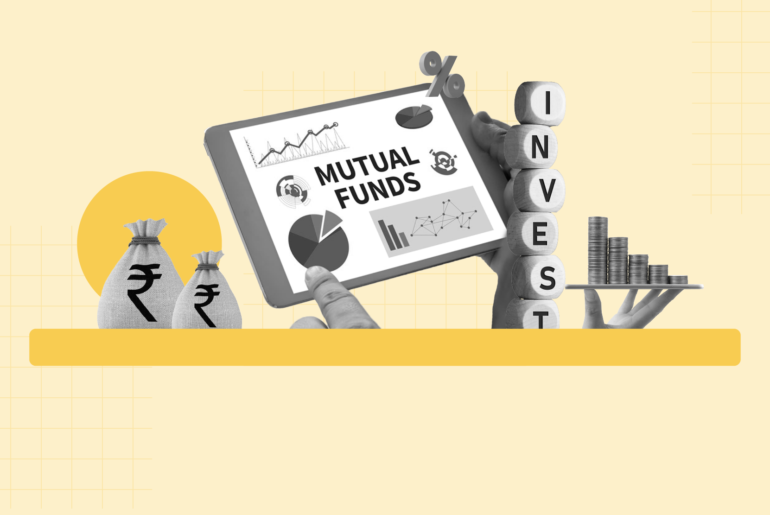Last Updated on May 24, 2022 by Aradhana Gotur
The COVID-19 pandemic struck the Indian economy drastically and various industries suffered the repercussions of lockdowns and stagnated demands. However, amidst all the chaos, the pharma and the FMCG sector saw a boost as medicines and necessities were the need of the hour. If you had investments in these sectors, you might have earned good returns on them. Alternatively, if you want to invest as per a particular theme, you can resort to thematic funds.
Table of Contents
What are thematic funds?
Thematic funds are equity-oriented mutual fund schemes that invest at least 80% of their portfolio in equity stocks and securities of companies that are aligned to a common theme. For example, in the case of infrastructure funds, the portfolio of the mutual fund scheme would be allocated to the stocks of companies in the construction, power, steel, cement, and other sectors that are directly linked to the ‘infrastructure’ theme.
How do thematic funds work?
Under thematic funds, the fund manager identifies a central theme and builds a portfolio around it. Investors willing to invest in the theme, pool their investments into a corpus. The fund manager, then, allocates the corpus to the equity-oriented instruments of companies that match with the overall theme of the fund. The portfolio is, thus, diversified across various stocks and yet the investment theme remains the same. When the value of the underlying assets of the portfolio increases, you can earn a profit. If, however, the value falls, you endure a loss.
Thematic vis-a-vis sectoral funds
Thematic funds may sound very similar to sector funds. However, these funds are different from one another. The main distinction comes from the scope of diversification. Sectoral funds invest in a particular sector. For example, pharma funds would invest in the stocks of companies engaged in pharmaceutical or healthcare business. Thematic funds, on the other hand, have a wider scope of diversification. They invest as per a central theme and this theme might have a multi-sectoral approach. For example, ESG theme funds include stocks of different sectors like IT, retail, power and construction, among others.
Common examples of thematic funds
While infrastructure funds are a popular type of thematic mutual funds in India, there are other themes that are seen gaining traction. Some are listed below:
- Technology theme funds
- Manufacturing theme funds
- India Consumption-focussed funds
- ESG theme funds
- Central Public Sector Enterprises (CPSEs) funds
- MNC funds
Benefits of thematic funds
There are two main benefits of investing in thematic mutual funds. They are listed below.
Diversification
One of the main benefits of thematic funds is that they offer considerable diversification. Since they are essentially equity-oriented mutual funds, the portfolio is diversified across quality picks from the stock universe. That apart, thematic funds have the option of investing across different sectors, diversifying the portfolio further. Moreover, since the portfolio is professionally managed, you don’t face the hassle of picking the right stocks for wealth maximization.
Attractive returns
Choosing the right theme at the right time is the most complex activity to perform when looking to invest in thematic funds. If you can identify the right theme which has the potential for growth in the future, you may get good returns on your investment. You may need to assess the market sentiment, explore industry prospects and look at government rules and regulations that may impact business in India, and identify a theme that exhibits potential to grow. Alternatively, you may reach out to a professional advisor for assistance in picking the theme.
Are thematic funds right for you?
Thematic funds can be a good addition to your portfolio. However, you should assess their suitability before you invest in them. Thematic funds are suitable for the following types of investors.
Those who have a healthy risk appetite
Since thematic mutual funds are equity-oriented schemes, you need to have a matching risk appetite to bear volatility risks. Though the risks might be diversified due to the portfolio allocation, they would not be entirely eliminated. So, if you are risk-averse, be mindful of the risks.
Those who have a long-term investment horizon
Equity mutual funds can offer good returns if you invest with a medium to long term horizon. So, if you have such an investment horizon, you can invest in thematic schemes and get good returns. Short-term investors, however, may face high volatility if the underlying theme does not perform as per their expectations.
Those who have the market knowledge to identify potential themes
Thematic investing works well only when you can tap into the right theme. To know which theme has a good future potential, you need to be conversant with the market factors and influencers. Thus, investors who have a basic understanding of the financial markets and those who can identify potential themes are more suited to pick thematic funds for their portfolio.
Those who are looking for diversification
Lastly, investors looking to diversify across different sectors with a single investment can invest in thematic schemes. Diversification is the key benefit of thematic funds and investors looking for a diversified and professionally managed portfolio find these funds suitable for their investment needs.
Things to remember when investing in thematic funds
It is important to keep the following things in mind when investing in thematic funds:
- Refrain from picking funds based on their historic performance alone. Historical returns are not an accurate indicator of future returns. Pick a scheme based on the theme that you believe has growth potential and would give good returns in the future.
- Compare between different thematic schemes and then choose a scheme that has offered consistent returns in the past. Consistency in returns shows the efficiency of the fund manager, and is a good parameter to assess when investing in thematic funds.
- Check the expense ratio of different funds. Pick a scheme that has the lowest ratio for maximum gains in the long term.
- Be aware of the taxation at the time of redemptions. If you redeem your investments within 12 mth, the returns earned would be taxed at 15% as short-term capital gains. In the case of redemption after 12 mth, however, you can avail tax-free capital gains but up to Rs 1 lakh. Should your returns exceed Rs 1 lakh, the excess would be taxed at a flat rate of 10%.
Capital markets are constantly evolving and new thematic funds are brought into existence by mutual funds to cater to the diversified interests of investors. If you are a discerning investor, you can pick out themes that have the potential to become the highlight of the financial markets in the future. You can, then, invest in such themes through thematic mutual funds and enjoy the returns when your selected theme gains traction and captures the growth in the market.




